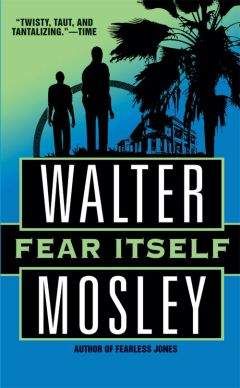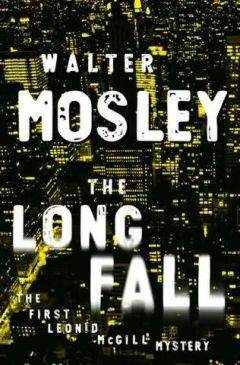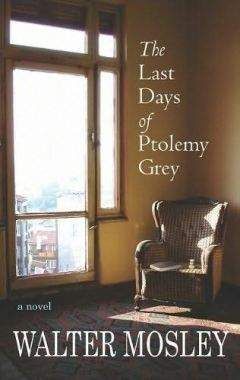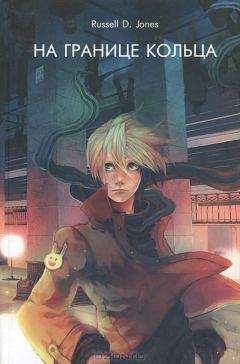Walter Mosley - Fearless Jones
Her rings and bracelets were in a jewelry box. Perfume was a single bottle. One scent was enough at her age. On matching night tables on either side of the bed there were pictures of Gella. Fanny’s photo was a more sedate one of the girl becoming a woman with someone else’s baby in her arms. Sol had one of her in a flaring summer dress, smiling and impatient. I imagined the plain girl was feeling beautiful that night, and she wanted to run away to dance.
Sol’s top drawer had about sixty dollars in bills and change in it. I took the money without feeling like a thief. The money Fanny had given me wouldn’t last long, and I needed cash to keep me and Fearless afloat.
There were papers of many sorts in Sol’s drawers. Mixed in among them were cuff links and thick rings, keys, and a pocketknife. Many of the papers were letters in foreign languages. I made out postmarks from Israel, Germany, and Argentina. There were old newspaper clippings of many things, including a recital that Gella had performed on the violin at a Jewish temple not far away. There was one article, clipped and circled in red, about Lawson and Widlow, the accounting company Sol had worked for. The firm was acting as broker for a French company that was selling an antique collection of jewelers’ tools to a museum in New York. The Cuthbert and Rothstein Museum of the Jeweler’s Art had purchased the eighty-seven instruments that were used to create the crowns of French royalty in the sixteenth and seventeenth centuries. The article was a few years old and yellowing. I put it in my pocket and opened the bottom drawer.
There was a clip-loading .38 in its original box down there. The maker’s name was Belson-Teeg. The gun was made from dark metal, and it was well cared for. I checked it out. It was open for business. The safety was off, and there was a bullet in the chamber.
I spent the longest moment thinking about that gun. Should I take it? I wasn’t a good shot, but I knew how to pull a trigger. Since Elana Love had taken Fearless’s piece I felt vulnerable. But if I took Sol’s fancy pistol and the cops found it on me, I’d be in trouble.
Would you rather be in trouble or be dead? The voice that came into my head was that of Lonnie “two-hand” Samuels, my pretend uncle and the number one troublemaker of Avery Island at one time. In his youth he had been on the chain gang twice. The sheriff of our sleepy community always braced Lonnie when a crime had been committed. But Lonnie didn’t do crimes by the time I was twelve. He just spoke out loud about what a man had to do if he wanted to keep his dignity and his life.
Remembering Lonnie’s advice usually made me do the opposite of what he said, because even though I loved my uncle, I knew he had a head harder than cast iron and he never worried about consequence.
“Hello?” a man’s voice called from downstairs. “Is anybody home?”
That made up my mind for me. I put the pistol in the belt under my loose shirt and went cautiously out of the bedroom.
The man I found standing at the foot of the stairs was smaller than I by a head, and that’s short. I could also tell that he was slight of frame in spite of the heavy overcoat he wore. But I didn’t regret my pistol. Even a little man can carry a gun. The visitor’s hands were in plain sight, so I went the rest of the way down to meet him.
“Hello,” he said, looking up at me with an expression too mild to be honest. I mean, here I was a black man in elderly white folks’ house with the door obviously left unlocked, and he didn’t so much as frown. Instead, all he did was ask, “Is Fanny or Sol here?”
“He’s in the hospital and she’s dead,” I said casually.
It’s hard to tell from a man’s face how he responds to terrible news. Sometimes tears are a blind for guilt. But the little man in the big coat didn’t cry. His eyebrows knitted a quarter inch. His lips pressed ever so slightly tighter.
“What happened? What, what happened?”
“Somebody came over here two days ago and put the hurt to Sol. This morning somebody broke in and choked Fanny till she was dead.”
“That’s terrible. My old friend. My old friends.” The little man took the opportunity to sit upon the bottom stair.
“Who are you?” I asked.
“Minor,” he said. “Zev Minor. I’m from Estonia. Like Sol and Fanny’s families.” He looked down at the floor and shook his head. Then he looked up and asked, “Could I have some water or something?”
“Yeah, come on.” I gave him my hand to help him stand and led him into the kitchen.
There was an unopened pint of peach schnapps in the spice cabinet. I poured a shot into the bottom of a water glass. Mr. Zev Minor took the glass gratefully. With both hands he poured the pink liquor down his throat. He closed his eyes against the burn and then opened them again to look at me.
“Excuse me,” he said, “but who are you?”
The right question at last.
I put the bottle down next to his glass and said, “My name’s Paris. I’m a friend’a the family’s. They asked me to come stay with Fanny after Sol got hurt.”
“But you say she’s dead?” Zev asked in a mildly accusatory tone. Again the right thing to say. “And where are Morris and Gella?”
“She’s with the police, helping them to find out what happened to Fanny after her husband dropped her off here,” I said, answering both his question and his accusation at the same time.
“Sol is alive though?”
“He got stabbed. He’s in the hospital.”
“Stabbed, choked,” Minor said, rolling his eyes from side to side. “This does not happen to good Jewish people. How can it happen?”
“I know what you mean. They were both good people as far as I knew them. Real people, you know? I mean if Fanny said it, then it was true, no lie to that.”
A light shone in Zev Minor’s eyes. A light that told me he knew what I meant. It brought us together in lamentation.
“I don’t understand. Why did they attack Sol?”
“I don’t know,” I said, only partway lying.
“Didn’t he say? Didn’t he tell you?”
“He was stabbed. Bad. Unconscious in his hospital bed.”
“Coma?”
“I don’t know about all that. His eyes are closed, at least that’s what Fanny said, and he ain’t talkin’.”
“I would like to see him,” Zev said. He took the bottle and poured another small shot. “Maybe I can do something.”
I saw no reason to keep Sol’s hospital a secret from a family friend. He was a mild old man who didn’t push or seem worried about hidden bonds. And so I felt bad when saying, “They had him at Temple, but then they said that he was transferred. I don’t know if it was because of his wound or for safety.”
Zev’s eyebrows knitted a fraction of an inch again. He stared at me long enough to ask himself a question and answer it, and then he nodded. He downed his drink and then stood up.
“If you see Morris, tell him to call me,” he said. “Tell Morris and Gella both how sorry I am. It’s so sad. It’s more than sad.”
He walked heavily toward the front door. I followed him, feeling guilty, like I had knocked somebody down and then kicked him for no good reason.
At the front door I said, “Mr. Minor.”
“Yes, Mr. Paris?” I could tell by his voice and his eyes that he was expecting me to give him a way to call Sol.
“Do you have a number I could give Gella and Morris?”
The expectations died in Zev Minor’s eyes, but he didn’t seem bitter.
“Morris knows my number by heart,” Minor said. “Don’t forget to tell him that I called and how sorry I am. Tell him that I will do whatever I can.”
“Where’d you say you knew Sol from?” I asked in a bushwhack sort of way.
“We were from the same town, like I told you,” he said in a whispery tone, “but that was long ago.”
“And he introduced you to Morris?”
“No,” Zev said. “That’s what’s funny. I met Morris only in the last year. We were doing business together, and while we were talking I found out that he was married to Sol’s niece.”
“I thought that Morris worked for a bank?” I asked.
“That’s right.” The tiny man reached out for my hand.
His skin was dry and papery, a little cool.
A few minutes after he left I shuddered, recalling the feel of his onionskin hand on my fingers.
17
ZEV MINOR’S VISIT faded quickly from my thoughts. I felt sluggish once alone again. The death of Fanny Tannenbaum had hit me hard. She was just an old white woman, that’s what I thought, but she reminded me of the women in my own family. She was strong and brave in the face of people much more powerful than she. She was sweet and comfortable in the company of strange men. Maybe she even sparkled a little while cooking for us and ironing our clothes.
I knew that I should be doing something, but I didn’t remember what.
I went through the library in the den, finally resting my eyes on a book, the title of which I had never seen before. Dead Souls, by Nikolay Gogol. The preface said that it was a Russian masterpiece. I had read Tolstoy and Dostoyevsky but never Gogol. The preface went on to say that he wrote about the travesty of serfdom in old Russia. It seemed like those old white people used to own each other at the same time that whites owned blacks in America.
For a moment or so I forgot about my problems and started to read the words of the long-dead Russian.
I suppose that the lock on the front door had been wedged open by the cops, because he just walked on in without rousing me from my reverie. When I sensed a shadow passing somewhere at the edge of my peripheral vision I jumped, screamed, and threw my book all at the same time. Luckily my aim was bad and Fearless had stayed back, knowing how jumpy I could be sometimes.
“Hey, Paris,” he said, holding his hands up in mock surrender. “I give.”
He wore black jeans and a denim jacket of the same color over a gray shirt. There was a watch with a gold band on his wrist and a pair of sunglasses stuffed in the breast pocket of his new jacket.
I wanted to crack wise about his new wardrobe, but the fear that made me jump was deeper than just edginess.
“What’s wrong, Paris?”
“They killed Fanny.”
Fearless and I hadn’t met until we were both full-grown men, but I felt that I knew him as a child, because every once in a while the boy would come out in his face. Loss and disbelief erased any swagger from the sex he had had with Dorthea the night before.
“No.”
Blood padded in from the doorway and regarded his newfound master.
“Somebody came in and choked her.”
“Where were you, Paris?”
“I was out lookin’ for them Messenger people. Didn’t come in till about eleven. I went over her niece’s house to get her, but Fanny’d already come here.”
Fearless hunkered down on the floor, elbows on his knees, hands propped on either side of his face. Blood licked a hand, but Fearless pushed him away.
“Who did it, man?”
He wasn’t looking at me, but still I only shook my head.
Fearless stood up all at once.
“Muthahfuckah,” he said, and then he grabbed me by the front of my shirt and lifted me from the floor.
He raised his fist, but I didn’t resist. Fearless was one of the kindest men I ever met, but the devil lived in him too. In a rage he was capable of murder. But he had never killed any friend that I knew of.
His eyes could have belonged to a dead man, they were so fixed. He didn’t seem to be breathing. I hovered there an inch or so over the floor.
Even though I’m often frightened, I have never been afraid of Fearless. I felt such a deep kinship with him that he never scared me.
When he let me go I stumbled but remained on my feet.
“Where is she?” he asked.
“Ambulance took her,” I said. “Gella went with them.”
“What you got?”
I considered my words carefully then. I knew he was close to killing, and I was taught never to point a loaded weapon at somebody unless I intended to shoot.
“Grove called me. He’s gonna meet us at the Charles Diner at nine.”
“He do this?”
“Naw. Naw, I don’t think so.”
“He know who did it?”
Before I could answer, Blood started barking and Morris Greenspan rushed in.
“Blood!” Fearless commanded, and the dog, still growling, stood down.
“Where?” Morris Greenspan asked. He was looking around the room. His eyes stopped on the floor of the den. “Gella said it was in there.”
The big, sloppy man was nearly in shock. His eyes were wide and his voice was strained to cracking. He lurched into the den and looked around, twisting from side to side.
“What happened?” he shouted, and then he fell to the floor just like a two-year-old throwing a tantrum. “What happened?”
He jerked and flailed around on the carpet for a while, but I didn’t mind. At least the spectacle distracted Fearless. After a minute or so we helped Morris back to his feet and sat him down in a chair.
“Why would anyone… how could they?” he said, and then he cried in earnest.
It was a deep, mournful wailing with no modesty or shame. He cried from his eyes and nose and mouth. He bent forward in the chair and called out for his Fanny, his Hedva. It was more like a pagan priest who had witnessed the death of his patron deity than a man who’d lost an in-law.
It was a full ten minutes before the lament subsided.
“How did you hear about it?” I asked.
“Gella called me at work from the hospital. She said that they were taking her to the police station to talk.”
“What did she tell you?”
“That Hedva was dead!” he declared.
“Did she want you to pick her up or meet her?”
“She, she… I guess.”
“Then why did you come here?”
“I thought I could do something. I hoped I could do something. I wanted to help.”
“But she’s dead, man,” I said. The anger probably came from my own frustration. “She’s dead, and your wife needs help down at the cops.”
“Leave him alone, Paris,” Fearless said.
Blood growled to back up his new master’s command, but he wasn’t sure if he was growling at me or Morris.
“No,” Morris said. “He’s right. I should go.”
“You better not drive,” Fearless said. “We’ll take you.”
GELLA WASN’T too much better off than her husband. She was sitting at the far end of the long bench in the entrance room of the Boyleston Heights precinct. There were a few others seated here and there. Mostly Mexicans. Mostly women. Waiting for their men, I guess. Nobody seemed happy.




